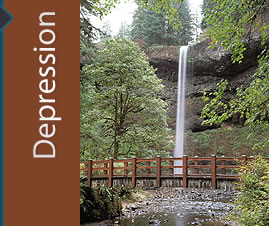

Depression
Are you feeling:
Persistent sad, anxious, or "empty" mood?
Feelings of hopelessness, pessimism?
Feelings of guilt, worthlessness, helplessness?
Loss of interest or pleasure in hobbies and activities that were once enjoyed?
Persistent sad, anxious or "empty" feelings?
Feelings of hopelessness and/or pessimism?
Feelings of guilt, worthlessness and/or helplessness?
Irritability, restlessness?
Loss of interest in activities or hobbies once pleasurable, including sex?
Fatigue and decreased energy?
Difficulty concentrating, remembering details and making decisions?
Insomnia, early–morning wakefulness, or excessive sleeping?
Overeating, or appetite loss?
Thoughts of suicide, suicide attempts?
Persistent aches or pains, headaches, cramps or digestive problems that do not ease even with treatment?
Feeling sad sometimes in life is natural. When this sadness continues on for months or even years, this is unhealthy. Depression is a serious medical illness; it is not something that you have made up in your head. It 1s more than just feeling "down in the dumps" or "blue" for a few days. Depression is feeling "down" and "low" and "hopeless" for weeks at a time. Hopelessness drains energy. We need hope to function in life.
Medications for depression do help but they won’t do the whole job. We also must learn how to connect with our feelings and take care of ourselves.
Depression is among the most treatable of psychiatric illnesses. Between 80 and 90 percent of people with depression respond positively to treatment, and almost all patients gain some relief from their symptoms. But first, depression has to be recognized.
